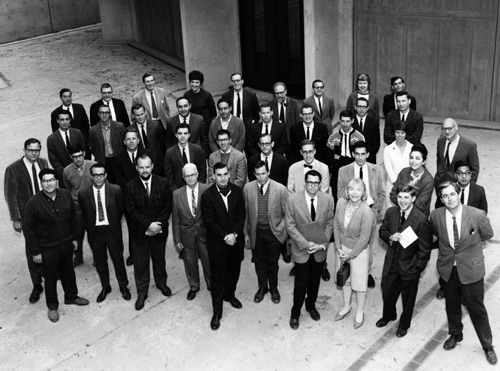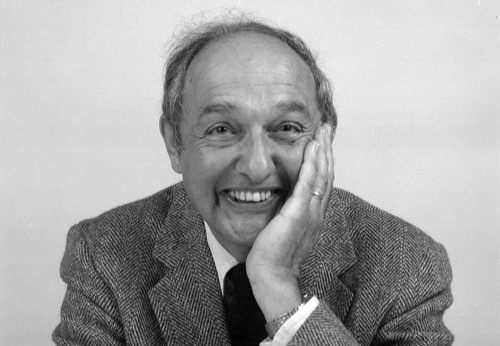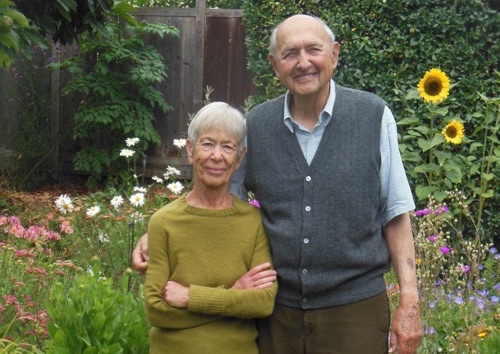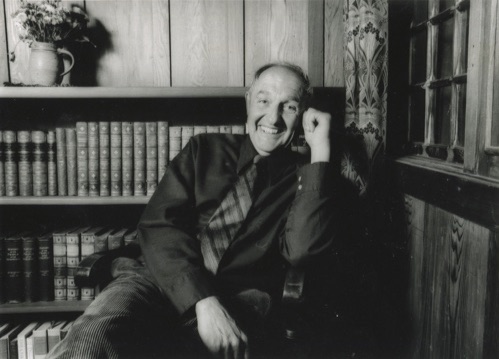Editor's Note: A memorial celebration will take place on Saturday, February 9, from 2-5:00 p.m. in the Stevenson Event Center. Please help the hosts prepare for the event by registering your intention to attend.
John Dizikes, a professor emeritus of American Studies and a founding member of the faculty of the University of California, Santa Cruz, died at his home in Santa Cruz on December 26, 2018. He was 86.
Dizikes was a Harvard-trained historian who joined UC Santa Cruz the summer before the campus first opened its doors to students in 1965. He was drawn to the school's commitment to undergraduates and its determination to be a different kind of modern research university—one organized around a system of smaller residential colleges that nurtured the student experience.
Over the course of 35 years, Dizikes was a professor of history, a professor and co-founder of the American Studies Department, provost of Cowell College from 1979-1983, and chair of the Council of Provosts.
"He was someone you noticed right away in a crowd—he was tall, with a deep voice. He literally stood out," recalled his friend and colleague of 50 years Todd Newberry, professor emeritus of biology and a fellow founding member of the UC Santa Cruz faculty. "I knew him from the start. Everyone thinks of John as one of the founding fathers of the campus."
A lifelong scholar propelled by an insatiable curiosity, Dizikes authored five books, including Opera in America: A Cultural History, which won the 1993 National Book Critics Circle Award for criticism. His other books include Yankee Doodle Dandy: The Life and Times of Tod Sloan, a biography of the Hall of Fame jockey; Sportsmen and Gamesmen: From the Years that Shaped American Ideas about Winning and Losing and How to Play the Game; and Britain, Roosevelt, and the New Deal: British Opinion, 1932-1938. Dizikes published his most recent book, Love Songs: The Lives, Loves, and Poetry of Nine American Women, less than a year ago, in March 2018.
Of Opera in America, Dizikes said, "I tried to write a story—not an encyclopedia or an analysis—and I tried to tell it in a way that would keep people reading. I tried to create suspense." And he credited his years of teaching with developing his skills as a storyteller: "Writing for a general audience is like lecturing to undergraduates. You have to show them why a subject is worth pursuing."
Making the leap to UC Santa Cruz

Dizikes was a young assistant professor of history at the University of Connecticut when he decided to make the leap and join the Santa Cruz campus. "Several friends said, 'For God's sake, don't go there, you'll end up doing the plumbing,'" he recalled during the campus's 50th anniversary celebration. "Of course they were right, but what they didn't realize was that it was incredibly exciting to start a place where we were relatively free to do new things."
The mythology surrounding the campus's earliest days hasn't been overblown, to hear Dizikes describe it in an account he gave for a UCSC oral history project: "Well, of course it was exceptional and we knew it and a lot of people felt it. And (Cowell College founding provost) Page Smith propagated overwhelmingly the idea shared by most of us, to a great degree, that we were now going to help with the reform of American higher education."
Newberry remembers those heady days, and the long hours involved. "It all made sense at the time," he recalled, describing Dizikes as the spiritual heart of Cowell College.
"If the first four colleges were a string quartet, John was the first violin: He set the pace, he set the tone, and he set the interpretation of what we were trying to do," said Newberry. "His office at Cowell was upstairs, off the breezeway, and you just felt like it was the condensation of the whole college right there."
Over the course of his career, Dizikes balanced teaching, writing, and administrative responsibilities, and he took pleasure in writing about topics that were overlooked by other scholars.
"Before he died, he was happiest to have his kids gather, and to have Love Songs out. It pleased him enormously," said Newberry. Dizikes described that book as a "group biography" of nine women writers.
"The most beloved professor"

Dizikes was a legendary teacher who mentored thousands of students throughout his career. He received the UCSC Alumni Association's Distinguished Teaching Award in 1985, and in 2002, the Humanities Division honored Dizikes' legacy by establishing the John Dizikes Teaching Award in Humanities. Presented annually to a faculty member of the division in recognition of their outstanding teaching, the award includes a $3,000 prize, as well as a student component: each faculty recipient selects an undergraduate to receive a $3,000 scholarship.
The first recipient, Bruce Thompson, called Dizikes "one of the most extraordinary teachers I've ever met." Upon hearing of Dizikes's death, Thompson expressed the sentiments of many when he said, "I don't think I'm going out on a limb in saying that he must have been the most beloved professor in the history of our university."
Dizikes had a monumental impact on many staff, as well as faculty and students, particularly at Cowell College. Adrianne Waite (Cowell College, B.A. American Studies, '81) met Dizikes as an undergraduate. Later, when working in student affairs at Cowell in the 1990s, she invoked his name when faced with a particularly challenging student discipline matter.
"I was struggling to find any way to reach this young man about making different choices," she said. "He was feuding with a neighbor and doing socially inappropriate things. It turned out he was in a class with John and really admired him. I found myself saying, 'Maybe next time you are in conflict with this person you could ask yourself, What Would John Dizikes do?'"
The student, who had been so oppositional, paused to take in Waite's words. "And his attitude and behavior did change," she said. "John was always so kind and gracious. I hoped it would prompt the student to examine his behavior, and it did."
Angie Christmann and Ziggy Rendler-Bregman co-led Cowell's student programs for many years and remained friends with Dizikes until the end. Christmann said Dizikes was like a "ray of sunshine."
"John just had a way of being completely personal instantly with you," she said. "You knew he was focused on this moment of encounter. It was delightful."
Dizikes valued their work in student affairs, and he and his wife Ann were a team. "They had the same intention," said Christmann.
"We said, 'This is the Golden Era,'" recalled Rendler-Bregman. "We knew we were in a very special time that was touched by his leadership." To this day, she cherishes a hand-written note she received from Dizikes after the birth of her first son, who arrived healthy but six weeks early. His message: "It is never too early for parents to realize their child will do unexpected things."
Contemplating how Dizikes would react to hearing the accolades being shared since his death, Rendler-Bregman painted a virtual picture: "He'd turn his head, close his eyes, smile that sweet smile, and say 'Okay, that's enough. That's enough now.'" she said. "He would receive it, but he wouldn't let it go on and on."
Lifelong friendships with students
For years after his official retirement in 2000, Dizikes would go to campus almost daily to check his mail, then walk back down to his home on the Westside. He remained an active member of the campus community, attending many Cowell College events, as well as Alumni Weekend festivities, including the Annual Dizikes Concert. The concert, established by alum David Kadish (Cowell College, B.A. history; 1973), was always a highlight of the weekend.
"He loved music, he absolutely loved music," Kadish said of his mentor professor and friend of 45 years. "Musical performance was a part of the culture of the early days of Cowell College, and I was crazy about music, so it felt like the right way to honor him."
Kadish met Dizikes early in his first quarter on campus, when Dizikes and his wife opened their home on King Street to any students who wanted to watch a new PBS television series, "Civilization." That ignited a connection that would endure for decades.
"He had a unique ability to bring students into the fold, and once you were there, you never wanted to leave," said Kadish. "He was comfortable in his own skin and did things in a way that made everyone around him feel equally comfortable. He made himself open and available to undergraduates. That was his love: undergraduates."
Dizikes was a former student of Cowell College’s first provost, Page Smith, whom he met at UCLA, and remained close to Smith during his career. At UCSC, Dizikes "threw himself into the undergraduate teaching commitment," said Kadish. "It wasn't easy for him, and he almost didn't get tenure because he spent too much time teaching and not enough time publishing. If he'd been turned down for tenure, there would've been a revolution in the streets of Santa Cruz. He was committed to the ideals of the campus and never lost those."
He was also demanding—of students, and himself. He labored over what others might consider insignificant details, such as whether to use the contractions "can't" and "isn't" in Opera in America. And he was delighted to receive a letter from a reader who appreciated his choice. "She said she knew as soon as she saw the book that she would enjoy it because I had used contractions," he said. "I had thought a lot about that."
Dizikes's scholarship, like his teaching, was marked by thoughtful deliberation, and he chose his subjects with care. "For a long time I was known, almost notoriously, as a non-writer," Dizikes said in 1994. "I just write about what I love."
Kadish recalled Dizikes's slight formality—he always wore a tie when on campus, for example. "Times have changed, but I would never have thought of calling him anything but Mr. Dizikes or Professor Dizikes until about 20 years ago," he added.
A provost for the ages

When Dizikes was named provost of Cowell College, he and Ann opened the provost's on-campus home to students in a new way, hosting many events, including small receptions with just a few students each week before College Night. By the end of the year, every Cowell student living on campus had received an invitation.
"They wanted real conversation, they didn't want chit chat," said Rendler-Bregman. "For some students, it blew them away and was the beginning of lifelong friendships."
Each week's invitees would join Dizikes and his wife at the head table. "John would step onto the stage to welcome everyone, and then, acknowledging that he didn't know everyone's traditions, he would call for a minute of silence together to appreciate where we were in that moment, gathered together for this meal," said Rendler-Bregman. "Think about that: Who else could hold 500 18- and 19-year-olds in silence for a minute?"
Dizikes, the son of Greek immigrants, grew up on a farm in Utah. His father, Peter, who was caring but strict, worked as a custodian and night watchman after they moved to Southern California. His mother, Virginia, was open, generous, and loving. From these humble roots, Dizikes grew up to be one of the campus's strongest champions of undergraduates, with an unwavering commitment to their education, growth, and empowerment. He literally changed lives.
"One of my only personal regrets is that for years, I invited them to visit our house in France," recalled Kadish. "Last year, I invited him again, and I remember he said, 'Well, maybe next year. I might have one more trip to Europe in me.' But he never made it."
Dizikes died of heart failure. He is survived by his wife Ann; their daughter Helen Sanders and her husband Rick Sanders; their son Peter and his wife Mary Lewis; four grandchildren; and his brother Dean and sister-in-law Marilyn. He is predeceased by a daughter Virginia, and his brother Leo and sister-in-law Kathy. A memorial gathering is being planned; details will be shared when they are available.
The family's obituary is available here.



